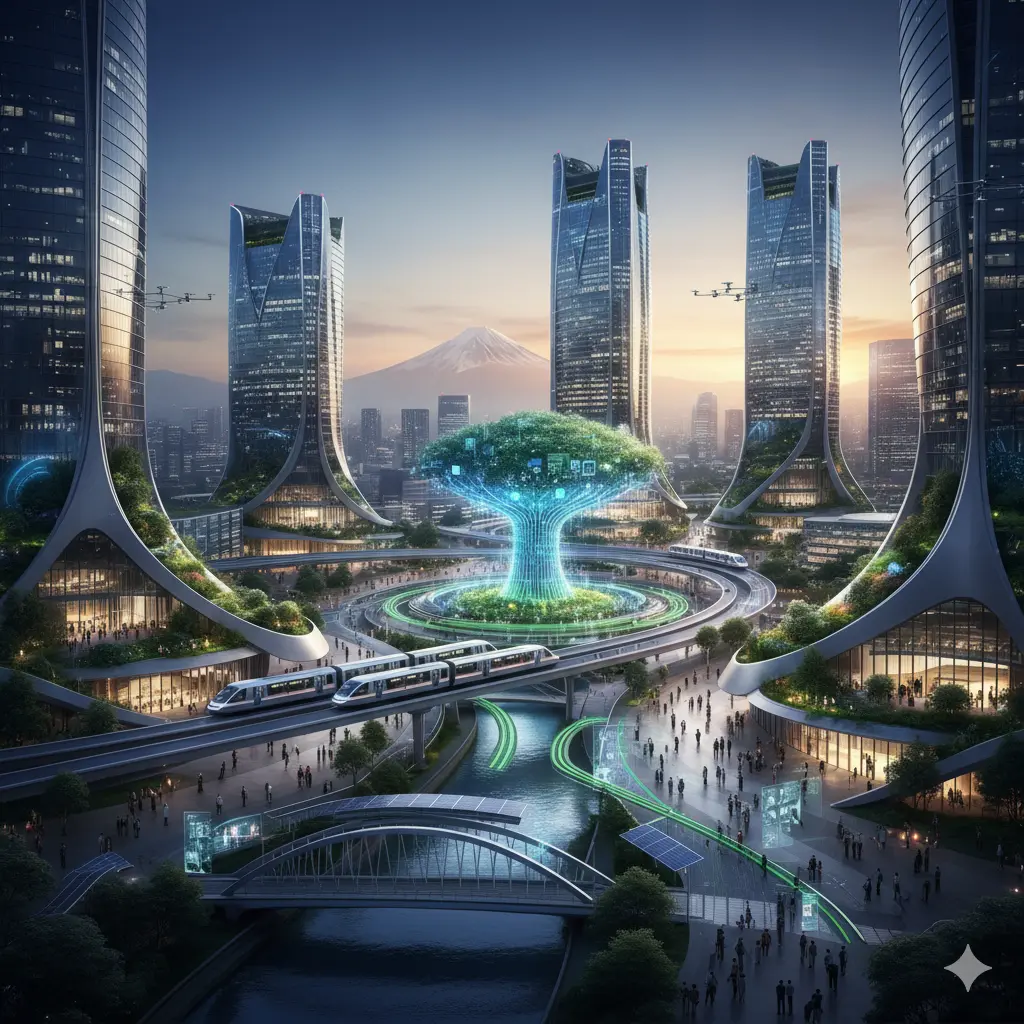|
Getting your Trinity Audio player ready... |
Japan has long been a pioneer in technological innovation, and now it is setting a new benchmark in AI-driven smart city development. In 2025, the Ministry of Land, Infrastructure, Transport and Tourism (MLIT), along with private tech leaders, announced a nationwide expansion of Smart City 5.0, an initiative designed to transform Japan’s cities into interconnected, sustainable, and intelligent ecosystems powered by artificial intelligence.
The initiative, backed by an investment of ¥1.5 trillion (USD 10 billion), will enhance infrastructure automation, optimize energy use, and improve public welfare through advanced data analytics and AI-driven policy systems.
Japan’s Smart City Vision for 2025 and Beyond
The Smart City 5.0 program aims to integrate AI, IoT, robotics, and 5G into everyday city operations. This initiative not only focuses on convenience but also emphasizes sustainability, inclusivity, and disaster resilience — critical for a country prone to earthquakes and aging demographics.
Japanese Prime Minister Fumio Kishida stated,
“Our vision is to create cities that think, adapt, and serve their people efficiently. Through AI, we are designing a society that is both technologically advanced and environmentally responsible.”
The cities of Tokyo, Osaka, Fukuoka, and Yokohama are at the forefront of this transformation, with plans to expand the model nationwide by 2030.
AI-Powered Infrastructure and Urban Management
AI plays a central role in managing Japan’s urban systems, from traffic flow to energy distribution. The Smart Mobility Grid, already active in Tokyo, utilizes machine learning algorithms to monitor real-time traffic patterns, optimize public transport schedules, and reduce fuel consumption.
Similarly, AI-integrated energy grids are balancing electricity distribution across districts, automatically diverting power during peak hours or emergencies. These smart grids are connected with renewable energy sources such as solar and hydrogen fuel cells, helping Japan move closer to its goal of net-zero emissions by 2050.
Robotics and Automation for Citizen Services
Japan’s strength in robotics has found new purpose within its smart cities.
In Fukuoka, autonomous delivery robots now operate in public spaces, providing goods and medical supplies to residents. Hospitals in Osaka are using AI-assisted diagnostic systems and robotic caregivers to address the nation’s aging population crisis.
Furthermore, AI-powered surveillance and safety networks are being implemented to enhance public security. These systems, powered by edge computing, can detect unusual activities, traffic incidents, and even environmental hazards in real time — alerting authorities instantly for rapid response.
Data-Driven Governance and Citizen Participation
The foundation of Japan’s smart city model is data-driven governance. City administrations use AI platforms that aggregate data from sensors, cameras, and IoT devices to assist in decision-making, resource management, and urban planning.
The Digital Agency of Japan has launched the Citizen Data Portal, allowing residents to access real-time information about transportation, air quality, and municipal services. Through this transparent data-sharing system, citizens can also contribute feedback directly to local authorities via AI-assisted chat systems, ensuring that governance remains both participatory and efficient.
Sustainable and Resilient Urban Design
In line with Japan’s Green Transformation (GX) strategy, smart cities are integrating sustainable architecture, green mobility, and zero-emission buildings.
- Yokohama’s K-Bay Smart District features AI-controlled energy-efficient towers powered entirely by renewable sources.
- Osaka Expo 2025, themed “Designing Future Society for Our Lives,” will showcase Japan’s latest smart city prototypes — including self-healing concrete roads, autonomous drones for logistics, and AI-managed waste recycling systems.
- Tokyo’s Digital Twin Project uses real-time 3D simulation to model urban changes, enabling planners to predict environmental impact before construction begins.
These advancements are not only shaping futuristic cities but also addressing pressing issues like climate adaptation and population decline through technology-driven planning.
Public-Private Partnerships Fueling Growth
Japan’s smart city ecosystem thrives on collaborations between the public sector and technology giants.
Key partners include:
- NEC and Fujitsu, which are developing AI-based infrastructure management systems.
- SoftBank Robotics, enhancing automation in logistics and public service.
- Panasonic and Hitachi, providing smart energy and IoT devices for residential integration.
International collaborations with Microsoft, Google, and Siemens are also underway to create interoperable AI frameworks that align with global data standards and cybersecurity norms.
Through these partnerships, Japan is positioning itself as the global model for ethical and sustainable AI in urban development.







